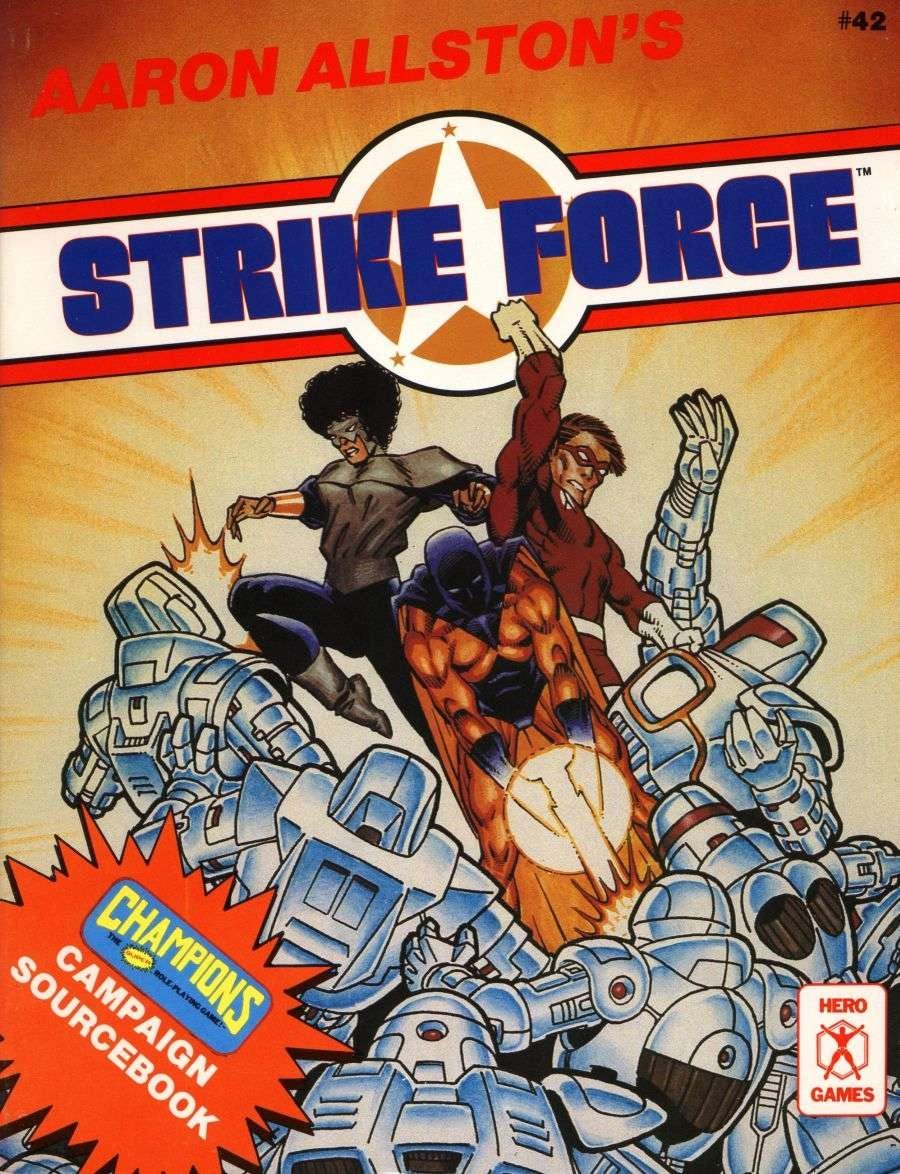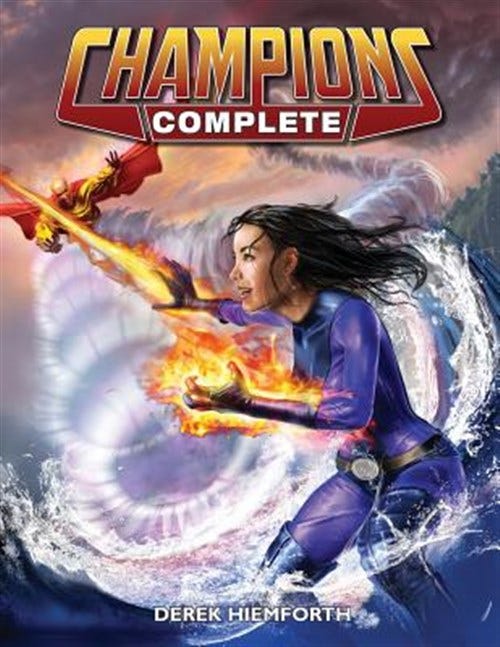Aaron Allston's STRIKE FORCE: A Must Own GM Resource
The Game Master's Essential Library Volume 1
Why am I Writing an GM’s Essential Library Series?
I’ve been reading through the 6th Edition (yes I call it 6th Edition because the changes in the Monk alone demonstrate it’s a new edition) Dungeons & Dragons Dungeon Master’s Guide this week and I’m of some very mixed feelings about it. There’s a lot of good material in the book, and I really like the return of Greyhawk, but I have two chief complaints. One of those complaints overlaps with one of the things I like about the book.
My first complaint is that a lot of the book seems to me to be “written down” compared to older rules editions. What I mean by this is that the language, vocabulary, and tone have a lower reading level score than the earlier editions of the game. Reading this book after reading Gygax’s AD&D Dungeon Masters Guide (sic) and David “Zeb” Cook’s Second Edition Dungeon Master’s Guide is a bit like reading USA Today after reading Atlantic Monthly and the New York Times.
This is a relatively minor complaint in that I do think that the High Gygaxian prose of the AD&D Dungeon Masters Guide can alienate readers. I do think though that David “Zeb” Cook’s writing in the 2nd Edition is clear and concise while still not talking down to the audience. My personal preference is that writing fall somewhere along Raph Koster’s learning/fun axis. His argument about games is that they remain interesting so long as the player feels they are learning and become more boring when things are too easy. I think that applies to reading too and the new DMG, in many sections, reads a bit too easy for me. Of course, it might not read so easy for a newer gamer.
My second complaint is regarding the tools that it provides the Dungeon Master to help them run adventures and develop their campaigns. There has been a lot of commentary about these tools on social media, but my critique is different than most. My critique isn’t in what tools are recommended for use, you can pick and choose on your own after all, rather it’s with the fact that they never “cite” their sources. While I wouldn’t quite say they are plagiarizing, it feels like they are rebranding and rephrasing existing ideas.
A lot of the player safety tools offered migrated into roleplaying games through the Story Game space with games like Sorcerer, My Life with Master, and Vampires: A Postmodern Roleplaying Game. These games all dealt with subjects that were dark, personal, and could easily lead to emotional trauma if handled poorly. While it is possible for any role playing game to wander into those kinds of subjects, the of the game expectations sheet in the DMG walks the edge of promoting such play. What irks me most about the inclusion of this worksheet is how the text doesn’t include discussion of the original sources for the concepts. The academic in me kept shouting “cite your work!”
Similarly, the discussion of player motivations/styles is a good one, but it is one rooted in a long tradition of Dungeon Master advice guides by Aaron Allston and Robin D Laws. Aaron Allston wrote extensively about player motivations in his book Strike Force and this writing was influential to Robin D Laws’ work in Robin’s Laws of Good Game Mastering and Dungeon Master’s Guide 2 (pages 42-49). Given that Robin was one of the writers for 4th Edition D&D’s Dungeon Master’s Guide 2, maybe Hasbro didn’t feel that they needed to include a citation. After all, they “own” the prior work. To be fair, they didn’t cite Laws when they wrote his player types into the 4th Edition Dungeon Master’s Guide (pages 8-10), but they did hire him to expand on them in the DMG 2. They haven’t done that with the new 6th Edition. which brings me to why I am writing this. I want to do a series of articles on books that I think every Game Master should own. A lot of these will be older books and when I select a new one, the discussion will include links to older books as well.
This first entry will center on the book that revolutionized how I think about role playing games, Aaron Allston’s Strike Force.
Aaron Allston’s Strike Force
At the Origins convention in 1981 Hero Games released what would become one of the best selling super hero role playing games of all time, a game that is still around and which has served as the IP behind a computer MMORPG. That game is Champions and it is one of the best games that the hobby has produced. It isn’t as popular today as it was at its peak, but it should be.
Historically Champions had a large and active fan base, though the fanbase began to dwindle a little between the 5th and 6th edition of the rules. I wish that dwindling would reverse itself as there is some very good new content for the game, in particular Champions Complete. I've of the opinion the past couple of editions of Champions and the Hero rules have become a little bloated and that this is the reasons for much of the decline in player base. Champions Complete reversed this trend when it was released and is only 240 pages in total. While much can be, and has been, written about the Champions game, there is one supplement for the game that transcends the game itself and is one of the best "how to run a campaign" supplements ever produced...for any game system.
When Champions was released in 1981, Aaron Allston worked for The Space Gamer magazine which was then a publication of Steve Jackson Games. Steve Jackson returned from the Origins convention with news of the game and asked Aaron to review the game for the magazine. Aaron did so and his positive review appears in issue 43 of The Space Gamer. This article was quickly followed by a "proto-Strike Force" article entitled "Look Up in the sky..." in issue 48.
In the article in issue 48, Allston describes how he came to be a Champions player and game master -- he would later become one of its premiere contributors.
The superhero campaign of Champions which I run, which is successful enough that it's been thrown out of TSG playtest sessions (it was crowding out all the other games), began as an irritation. Steve Jackson came back from Origins with the news that some new company in California had nabbed the name Champions; I'd hoped to use Champions on a personal game project. I could review the Hero Games offering if I wished. Wonderful.
Looking over the rulebook, though, I was impressed. The game appeared clear and coherent after a single read-through and seemed to faithfully simulated the four-color stuff of comic books. Extensive solo playtesting ensured almost immediately, with the heroic Lightbearers waging a running war with the criminal mastermind Overlord.
In the end, Overlord's munitions-running scheme was wrecked; the Lightbearers disbanded, with one member dead and two others unwillingly allied with the villain; and I had chosen to run Champions on a regular basis.
There is a good deal more to the article in which Allston shares with potential players and game masters some guidelines and some pratfalls that might happen as one plays a super hero campaign. How does one exactly acquire a super hero secret headquarters anyway? One can see the foundations for the book Aaron Allston’s Strike Force in the article, and Allston provides a nice glimpse into what can contribute to the running of a successful game. As good as the article is, it pales in comparison to the Champions sourcebook that Allston wrote based upon that early -- initially merely a playtest -- campaign.
Aaron Allston’s Strike Force is one of the better campaign sourcebooks ever written. It has a very simple arrangement. It begins with a section on campaign use. This section is not a how to plot an adventure section, as by 3rd edition Champions had a pretty good chapter on that, rather it was advice for dealing with very specific problems. This chapter covers the following:
The "Character Story" -- discusses how to help players develop the character stories that they dreamed up when they initially created the character.
Simulating the Comics -- discussed how to keep the players behaving in a four-color fashion.
The New Player
Aging the Hunteds -- How to make "Hunted" behave like real world constant interactions rather than as a mere random roll done each week.
Listening to Your Players
Ground Rules
Translation Follies
Types of Champions Players -- The Builder, The Buddy, The Combat Monster, The Genre Fiend, The Copier, The Mad Slasher, The Mad Thinker, The Plumber, The Pro from Dover, The Romantic, The Rules Rapist, The Showoff, and The Tragedian.
Character Conception Checklist
How to Ruin Your Campaign
If Allston had written no other sections than the "types of players" and "how to ruin your campaign" sections of the sourcebook, this would be an invaluable resource. Allston's breakdown of player types builds upon some of the discussions which had been going on in Different Worlds magazine and other places in the game-verse, but his clear description of the varied motivations of players is spot on and extremely useful. Between Aaron Allston’s Strike Force and Robin Law's book on Game Mastering Rules, you have almost everything you need to run any game successfully...if you follow the advice that is.
In addition to the overview on Campaign advice -- generic campaign advice -- Allston then continues providing an invaluable tool by giving us a look into his own campaign in the subsequent chapters of the book. We are given an "Abbreviated History" of the Strike Force campaign, which can be used as an example or as an outline for one's own campaign. He provides the full roll call of the Strike Force and Shadow Warriors teams as well as Independent heroes and a number of Villains from the campaign. This is followed by a detailed history of the campaign -- both his real world work and the in game history. In the history, Allston shares some of the storytelling challenges he faced and how he overcame them in play.
If you can find a copy of the book, I highly recommend it.






I could not agree more wholeheartedly. Strikeforce leveled up every GM who read it back in the day. It's a part of my creative DNA. I was very lucky to get to meet Aaron and we became friends through Austin-based conventions. I'm glad this is a part of his legacy.
Aaron was one of the all-time greats, and I've been inspired by his work and getting to know him a little in person.